- Home
- Robin McKinley
Shadows Page 24
Shadows Read online
Page 24
“Don’t be absurd,” said Mom, but she didn’t sound grown-up commonsensical angry, just bewildered.
“I think absurd is what we’ve got,” said Takahiro. “Being a werewolf is pretty absurd. I’m used to it.”
“I really want you to come,” I said. “But—”
“You might be able to use a hundred-and-sixty-pound wolf,” said Takahiro. “Think about it.”
“Okay,” I said. We smiled at each other. Absurdly.
Jill was still crying, but she raised her head and looked at me. “Are you serious?”
“Yes,” I said, but I was thinking: All very well, the gruuaa might be able to get us—as far as we can get, but then what? Major Blow-it would hardly be holding them somewhere that two teenage girls and a hundred-and-sixty-pound timber wolf could break them out of easily.
There was a knock on the door. Jill and I startled so hard our heads banged together. We stood there clutching each other—nobody’s idea of a courageous rescue party. Mom got up, wiped her face hastily with one hand, and answered the door.
It was Casimir.
“I am sorry,” he said, and looked over Mom’s shoulder at Jill and me standing like incompetently reanimated zombies at the end of the front hall, in the little space between the kitchen table and the back of the sofa. His eyes met mine and he smiled, but it was a worried smile, and it didn’t dazzle me the way it had yesterday. Jill and I moved apart, and Takahiro walked around the end of the sofa to stand beside us. Takahiro and Casimir hadn’t met before; Taks didn’t eat a lot of pizza. They looked at each other. I couldn’t see Takahiro’s face but I could see Casimir’s, and I couldn’t read his expression: it might have been shock. Even if he could read somehow that Taks and I had been kissing, I didn’t think that would qualify for shock. I didn’t like the other possibility.
“I can see I am here at a bad time,” he said, and I waited for him to finish, I’ll come back some other day. And next time, call first, I thought. He’d phoned first yesterday. Maybe the armydar was getting to him too.
But instead what he said was, “May I come in?”
Gods’ engines. We didn’t need any more complications. Even beautiful ones with heart-stopping dimples.
Mom, probably still a little confused by recent events, stood aside, and he walked in with that same wild-animal grace I’d noticed yesterday. He didn’t need trees and daylight; he had it walking down a short narrow hall in a boring little house at the dull end of town. Takahiro, who really was a wild animal, walked like a human boy who thought he was too tall.
Casimir stopped in front of me. “My mother is a magician. She did not like it that I wished to study science. I almost did not accept the scholarship to Runyon, even though I had applied for it, because she disliked it so much. And then they almost did not let me come, because my mother is a magician. But at last they did let me come. I have been in this country only a fortnight. I began the job that my mentor found for me at the beginning of the week. On the third day of my new job, a large cobey opened in a town less than ten miles away from the town I now lived and worked in. I had been told during the two days of induction seminars the trust gives to all its students on arrival that we would not see a cobey here, that big ones were so rare it was not worth wasting time telling us what to do if we did, that if there was one anywhere the army cobey units would have contained it before we knew it existed.
“That night, before the cobey was announced, two young women walked into my new workplace, and one of them called the other one mgdaga. The mgdaga is our great heroine; there have been several mgdaga in the history of my country, although the last one was over two hundred years ago.
“On the fourth day,” Casimir continued, his eyes never wavering from my face, “I met the mgdaga again, and saw her perform a magic I have never heard was within the skill of any magician, and my mother knows a great deal about magicians and what they are capable of, and I have learnt much of what she knows merely by being her son. I discovered that the mgdaga was a friend to gruuaa—and that she was stepdaughter to Valadi Crudon, himself a great magician, who had disappeared from his homeland in some mystery seven years ago. My mother taught me that there is no coincidence, only shortsightedness.”
Most of this had washed over Mom, fortunately, but she reacted to Val’s name. She said sharply, “He did not disappear. He uses his own name. He has always used his own name.”
Casimir nodded, although the way he did it was almost a bow. “It is only other magicians who—who revere him. And I imagine the olzcar—bureaucrats put a—a blind on his name, so that it did not stand out. So that if you looked for it, it would look like—like—”
“John Smith,” I said. “And the gruuaa followed him. He believed they—his old masters, his old government—had taken all his magic, but the gruuaa followed him anyway. And hid the fact that not all of his magic was gone. He came here, to Newworld. And the gruuaa—hid him.”
I raised my hand in what had become a habitual gesture, to run my fingers gently across the slightly-disturbed-air that was Hix where she was looped around my neck.
“I believe no human has ever really understood gruuaa,” said Casimir. “But they are very loyal to those they choose.”
There was a little silence. There was no way I was going along with this magdag thing, but we still needed to get on the road after Val—before the non-magdag’s nerve broke.
“He did no magic,” said Mom. “He didn’t even know about the gruuaa—till Maggie told him. But he did no magic.”
Thanks, Mom, I thought, but Casimir was already staring at me.
“But—Takahiro—” Jill said cautiously.
Taks shook his head. “What Val did for me was just from knowing about . . . There wasn’t any magic.”
Casimir looked thoughtfully at Takahiro. “You’re a were,” he said. We all stiffened and I moved involuntarily closer to Taks as if I could protect him. The hamster protecting the mountain lion. But hamsters are more acceptable in small social groups.
“How do you know?” said Takahiro levelly, not trying to deny it.
Casimir ducked his head again. “I’m sorry. But I would like to convince you that I am on your side.”
“On the—the what?” murmured Jill. “The magdag’s side?”
“The mgdaga,” said Casimir. “Yes.”
“Why?” said Mom. “Why do you want to convince us? Why do you think it’s about sides?”
“A mgdaga only appears when there is need of her,” said Casimir calmly, like we were discussing pizza-topping choices. “I know Takahiro is a were because my mother has friends who are weres, and after they have worn their animal selves recently there are traces left on their human selves. You have been your animal self recently, I think.”
So that’s how you managed to move the plate before Majid got it, I thought, as Takahiro said, “Yes.”
Casimir nodded, and then looked around at us again. “Is Valadi not here?” he said. “He will know of the tradition of the Ukovian mgdaga.”
“They’ve taken him away,” said Mom, and she was beginning to sound angry. That was better than desperate and fragile. “The army came—and took him away.”
Casimir looked at me again. “Don’t look at me like that,” I said resentfully.
“Magdag,” breathed Jill.
“Oh stop,” I said. “Okay, Casimir, listen. We’re going after him—Val. And Arnie too. Jill’s mom’s partner. They’ve taken him too, which makes even less sense. He’s born and bred Newworld, he was never a magician in the first place. Do you want to help us?”
“That is why I came here,” he said. “I do not like this—armydar. And I hoped the mgdaga would have something I could do.”
“Stop it,” I said. “That’s my first—er—whatever. No mgdaga gomi—garbage. I know about the gruuaa, but that’s all.”
“You a
re joking,” said Casimir. “I was in the park with you yesterday. When you folded up a large cobey and tucked it in on itself so tightly it could not come loose while we escaped—and then called the gruuaa to hide us from the army.”
“They never have announced a cobey in the park,” Jill said. “Mags is a good folder.”
My eyes went to my algebra book, lying innocently on the coffee table next to the empty tray. Innocent except for the fact that I’d left it in the car. “I didn’t call the gruuaa,” I said. “They came. Fortunately for us.”
Casimir shrugged, his elaborate, not-Newworld shrug, very like Val’s. “They knew to come,” said Casimir. “They have chosen you. And they knew you needed them. It is very nearly the same thing.”
Mom said, “Maggie?” It was half her Mom voice and half something else. It reminded me a little of Gwenda’s voice.
“I don’t know what happened,” I said, a little too loudly, not wanting to remember the wind that felt like it could rip the earth to shreds—the feeling that the earth was crumbling away underneath me. Or the feeling of folding the torn-out pages of an algebra book, and that awful, falling-into-the-void feeling that every fold I made was creating another endless invisible line that was trying to drag me down into that nothingness. That I was trapped in a web that I was weaving—folding—myself. “Takahiro’s a better folder than I am,” I said. “Enormously better. And it was that critter you gave me, Taks, that I chose to fold—to try to fold.” The fox-wolf-dragon. Like my Hands Folding Paper critter. I was talking to Taks now, as much as anything to make everyone stop staring at me. “I didn’t know what to do, and I remembered you’d said to keep her close.”
Takahiro nodded. “I—I don’t get this, but my mother was”—he glanced at Casimir—“also a magician, sort of. She taught me origami, and she taught me about the kami, and she taught me how—stuff crosses borders sometimes.”
Like being a were, I thought. That’s a great big border crossing.
“There’s been some buggie thing crossing borders anyway,” Jill said. I already knew she’d been picking up more lately—foresight stuff—more than just seeing gruuaa and having premonitions of doom while the armydar crushed us like a boot on a silverbug. And choosing to drive the Mammoth today. She went on: “I don’t know if that’s because of the cobey—the cobeys—with the number of silverbugs we’ve had around for like the past six months—or the armydar, the last couple of days. But—it’s like the borders are getting all messed up. I can almost see—it’s a little like the way the gruuaa twinkle in the corners of your eyes. And”—she was using her you’re-going-to-pay-attention-to-what-I’m-telling-you-and-then-you’re-going-to-pass-your-math-exam voice—“I think the armydar is making it worse.”
“Yes,” said Mom wearily. “It was my mom who taught us that, us four girls, when they were first inventing the armydar. That this is what would happen, sooner or later—that the army’s technology is itself unbalanced and could, and probably would, further unbalance the dangerous situation a big cobey creates.”
There was an ugly little silence.
“Then we’d better go,” I said, still too loudly—or maybe it was the armydar making my voice echo. “Do what we’re going to do.” Whatever that was.
“Maggie—” began Mom.
“Look, I have to,” I said. My cape had scattered, but there was now a single gruuaa trying to wind itself up my unoccupied-by-Mongo leg. I absentmindedly put my hand down to help her. Him. Whatever. It curled around my arm and up onto my shoulder. There were faint furry greetings or—what do I know—gossip-exchanging waggles. I was pretty sure—for no reason—that I had been clambered on by this one before. It wasn’t the one who’d come back to tell Hix what was going on after they’d all left us at the shelter, but it still felt half-familiar. I was going to have to learn more of their names. There was the faintest—the faintest drift of something across my mind—something that wasn’t me. Whilp, it said.
I shivered. “I have to,” I said again. I sounded like I was telling the truth.
Mom stared past Casimir to the wall. She’d rehung Great-grandmom’s quilt. The only light was from the lamp I’d turned on in the living room, and the quilt gleamed in the twilight, green and gold and palest pink and cream and deepest red and purple. I thought suddenly that I was wrong about this being a boring little house: no house could be boring with that quilt hanging on the wall. Many of the squares had plants on them, mostly flowers, a few with just leaves; you could see where Mom’s gardening instincts had come from. But quite a few had animals on them, and the animals were often watching you through some plant or other. I hadn’t thought of it in years, because this particular square hung near the floor, but it had fascinated me when I was shorter: it had a little round, furry or feathery face, peering out through leaves so dark they were almost black. You couldn’t see much of the face—except that it seemed to have three eyes.
I was pretty sure Mom knew I’d go whatever she said, but I’d rather she accepted it. But she was my mom, and I was seventeen years old, and it was kind of a jump from being a reliable dog owner to being a magdag.
We were all silent. We should be making plans, I thought. What plans are there we can make? We didn’t even know where Val or Arnie was. Maybe if I took Great-grandmom’s quilt off the wall again and laid it on the floor it could do the enchanted-flying-carpet trick. I couldn’t remember if flying carpets in fairy tales could go through walls or not. And the armydar might mess up its homing instinct. Doshiyo, I thought. Doshiyo, doshiyo. What do I do?
At last Mom nodded, a stiff little jerk. “Gods’ holy engines,” she said grimly. “I don’t think I can stop you, much as I think I should. And it’ll be easier afterward for both of us if I say okay now. But I also think the usual systems have broken down. That’s the cobey, perhaps—or the armydar. And I find Casimir’s version of events rather compelling.” She smiled at me; it was not a happy smile. “You are so much like your grandmother,” she said. “It doesn’t really express it to call her stubborn. When she made up her mind about something . . . she made granite look soft and pliable.” She paused. “Your grandmother—like your great-grandmother—was also a powerful magician.”
“And you, Mom?” I whispered.
“I’m the sister who gave it up,” she said. “I’m the one of the four of us girls who wanted to be normal. I’m the one who fell in love with someone whose family had never been gene-chopped because there was no gene to chop, who went to secretarial school so I could get a job sooner, because Ber was going to graduate from Runyon in a year and we could get married. And then I went to accounting classes in the evenings before you were born, because I liked arithmetic. You know where you are with addition and subtraction.” She leaned forward, over Mongo, still attached to my leg, and put her arms around me. Hix (and perhaps Whilp) did her bodiless-shadow thing: I felt her patting my face and I think Mom’s too, not at all dismayed by there being no space between us for her to be. I thought I felt Whilp making a nest in my hair. I have bad hair most days; a gruuaa couldn’t make it much worse.
“Go with love and luck,” said Mom. “And with magic. I send you with all that I can offer you.” She kissed me on the cheek—and there was a funny little tingly feeling, almost gruuaa-like.
“Giving up magic didn’t work so well for Val,” I said.
“No, it didn’t,” she agreed. “Which is probably why I’m not shutting you up in a closet right now. But you’d better leave before I break down entirely—before I remember that I’m your mom and you’re seventeen years old. Ran and I will go to Gwenda as soon as he gets home, which had better be soon. Come . . . come after us . . . as soon as you can. That house is not called Haven idly. There is still magic there—Gwenda will help us. I wish I were taking you and Val there now.”
I turned and nearly ran out the door. I also nearly tripped over Majid. “Come on,” said Jill, grabbing my arm. “N
o falling down. I’m sure we need you in one piece.”
We went down the sidewalk together while I said to myself, I am not going to cry, I am not going to cry. It will be fine, Val will like Haven, and he’ll figure out how to get along with Gwenda (my dad used to call her formidable). Takahiro appeared on my other side carrying Majid, who was (astonishingly) purring again. Mongo had come out with us and then shot ahead and had his forepaws up on the rear door of the Mammoth (this was not allowed, of course: dog claws scratch paint) and was wagging his tail so hard it was in danger of coming off, while Bella strained to get her muzzle through the quarter-open window to touch noses with him. “That’s a yes then,” said Jill. “If I open the door, will he get in, or will everyone else come out?”
“He’ll go in,” I said, “if we make it obvious enough that that’s the plan.” By the time this had been achieved, not without a certain amount of swearing and being hit in the face by wagging tails, Casimir had joined us. “If we put this end of the rear seat up, I can get in the back,” I said, pulling dog hair out of my mouth. “It’s either me or the dog food—that’s an easy one. And it’s dumb to take two cars. Then Casimir can get in front.” It was nearly dark; the streetlights had all come on and there were shadows everywhere. Some of them were gruuaa.
“I’ll come in the back with you,” said Takahiro. “You can sit on my lap.” I didn’t quite laugh, remembering how crowded the three of us had been on the drive over—and Casimir was a lot wider than either Taks or me. Shoulders. Yes, I know, I’d been kissing Taks and liked it a lot. And I wasn’t minding the idea of sitting in Taks’ lap at all either. But Casimir totally won on the shoulders and a girl can look. And if Taks was in back with me we could stuff everybody’s knapsacks under Casimir’s feet. He’d brought one that looked like he was going camping for a week. I didn’t want to think about what he imagined the magdag was going to need.
Supposing we found Val and Arnie and wanted to take them away from wherever they were, where were we going to put them? On the roof?

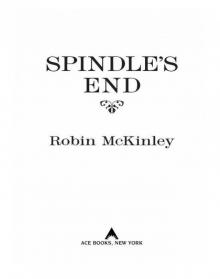 Spindle's End
Spindle's End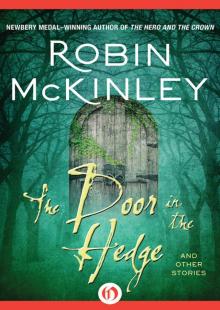 The Door in the Hedge: And Other Stories
The Door in the Hedge: And Other Stories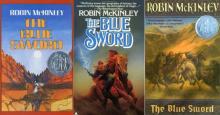 The Blue Sword
The Blue Sword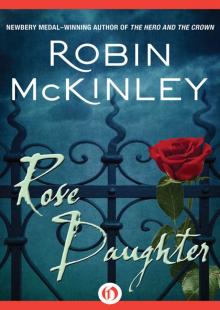 Rose Daughter
Rose Daughter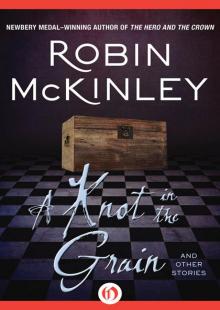 A Knot in the Grain and Other Stories
A Knot in the Grain and Other Stories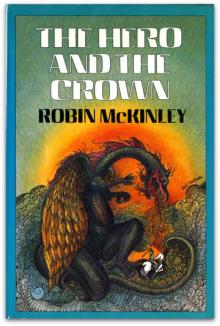 The Hero And The Crown
The Hero And The Crown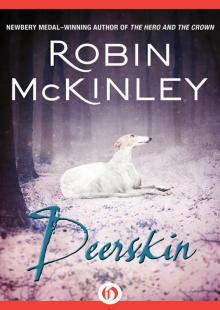 Deerskin
Deerskin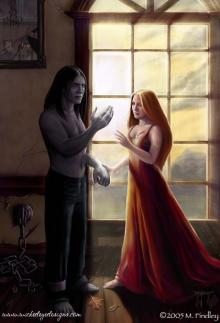 Sunshine
Sunshine Beauty: A Retelling of the Story of Beauty and the Beast
Beauty: A Retelling of the Story of Beauty and the Beast Shadows
Shadows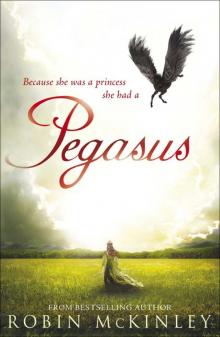 Pegasus
Pegasus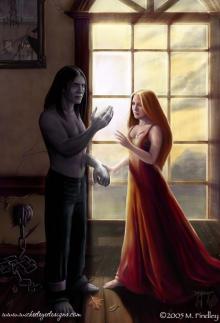 Chalice
Chalice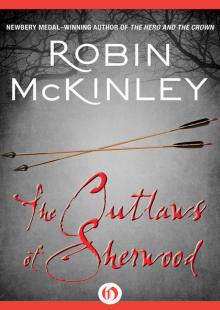 The Outlaws of Sherwood
The Outlaws of Sherwood Fire: Tales of Elemental Spirits
Fire: Tales of Elemental Spirits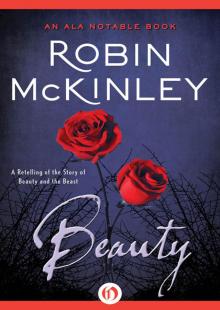 Beauty
Beauty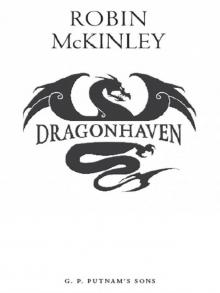 Dragon Haven
Dragon Haven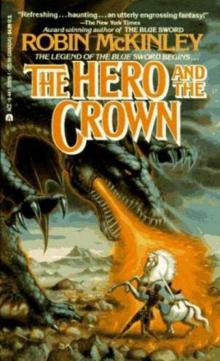 The Hero And The Crown d-2
The Hero And The Crown d-2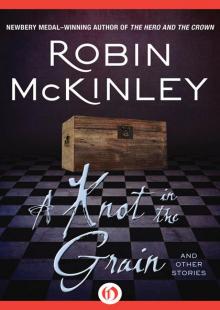 A Knot in the Grain
A Knot in the Grain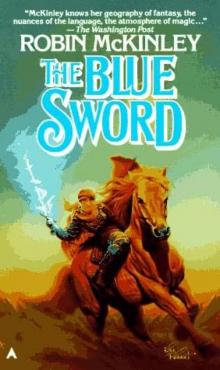 The Blue Sword d-1
The Blue Sword d-1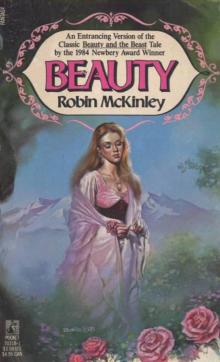 Beauty (v1.2)
Beauty (v1.2)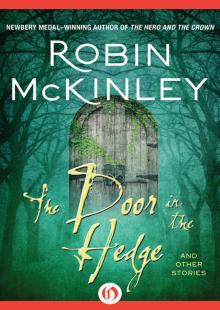 The Door in the Hedge
The Door in the Hedge